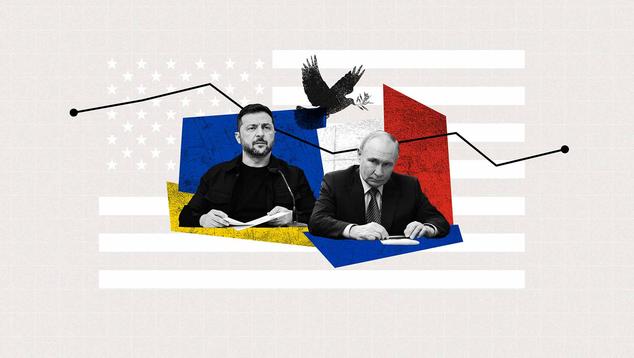WASHINGTON, D.C. — Two-thirds of Americans are very (22%) or somewhat (45%) pessimistic that an agreement between Russia and Ukraine can be reached to end the war, while 31% are optimistic. This pessimism is shared across the major U.S. political groups, although Republicans (57%) are less pessimistic than Democrats (78%) and independents (69%).
This skepticism toward a peace deal comes as Americans continue to see the war as a stalemate, with 66% saying neither side is winning, while 23% believe Russia is winning and 10% say Ukraine is.
These findings are based on an Aug. 1-15 Gallup poll completed before President Donald Trump met with Russian President Vladimir Putin on Aug. 15 and Ukrainian President Volodymyr Zelenskyy and European leaders on Aug. 18. Trump subsequently indicated that he wants to arrange a joint meeting between Putin and Zelenskyy, although nothing has been officially announced.
Before the recent meetings between Trump and the warring nations’ leaders, 26% of Americans were very concerned and 52% were somewhat concerned that the U.S. and its allies would be unable to negotiate an agreement to end the war.
Americans are also highly concerned about the fairness of the terms of any negotiated settlement, as well as about the prospect of Russia respecting such a settlement. Thirty-seven percent of U.S. adults are very concerned and 36% somewhat concerned that an agreement to end the war would be too favorable to Russia, while 57% are very concerned and 30% somewhat concerned that Russia would violate the terms of any agreement reached to end the war.
In contrast, relatively few Americans are worried about a peace deal being too favorable to Ukraine or about Ukraine violating the terms of such a deal.
Americans Tilt Toward Helping Ukraine Reclaim Territory
Americans are mostly divided over which of two approaches the U.S. should take to promote an end to the war. A slight majority, 52%, want the U.S. to support Ukraine in reclaiming lost territory, even if that means a prolonged war. Forty-five percent favor the U.S. trying to end the conflict quickly, even if that means Ukraine has to give up part of its former territory.
When the war began, two-thirds of Americans favored the U.S. helping Ukraine reclaim its territory for as long as it takes. Though fewer hold that opinion today, it has been the more prevalent view in all but one survey, in December 2024, when Americans were evenly split.
Supporters of the major U.S. political parties take opposing positions on how the U.S. should help end the war, with most Republicans favoring a quick end to the war and most Democrats wanting to help Ukraine reclaim lost territory.
Democrats’ views have changed very little since the war began. At least 69% have consistently favored helping Ukraine reclaim its territory, including 80% in the current survey.
Early in the conflict, Republicans were divided, but over time have shown a clear preference for a quick end to the war, with most of that change occurring within the past year. Currently, 69% of Republicans want the U.S. to help end the war as soon as possible, a slight decline from 77% in March and 74% in December.
Independents are currently divided over which approach is better — but initially, they favored the U.S. helping Ukraine reclaim captured territory for as long as needed, by nearly 2-to-1.
Plurality Say U.S. Not Doing Enough to Aid Ukraine
More generally, 46% of Americans say the U.S. is not doing enough to support Ukraine, tied with March as the highest in the three-year trend. The remainder are split evenly between saying the U.S. is doing too much (25%) to help Ukraine or is doing the right amount (27%).
Democrats overwhelmingly say the U.S. is not doing enough, while Republicans are split between saying the U.S. is doing the right amount or too much. Independents’ opinions mirror the national averages.
Since the Trump administration took office, more Democrats (77%, up from 48% in December) and independents (44%, up from 32%) have said the U.S. is not doing enough to help Ukraine. At the same time, fewer Republicans say the U.S. is doing too much (40%, down from 67%), and more say it is doing the right amount (42%, up from 20%).
Implications
High-profile meetings earlier this month between Trump and Putin and between Trump and Zelenskyy increased the pressure for reaching an agreement to end the Russia-Ukraine war. However, no obvious progress has been made toward a deal, and the fighting in that region continues. Americans themselves are divided as to whether the U.S. should seek a quick end to the war or support Ukraine in a continued effort to reclaim territory Russia has captured.
The change in presidential administrations, from a reliably Ukraine-friendly Biden administration to a sometimes Ukraine-skeptical Trump administration, has led to an increase since December in the percentage of Americans who think the U.S. is not doing enough to support Ukraine. Moscow’s continued attacks on Ukraine have frustrated Trump, and he has recently renewed threats to impose sanctions on Russia.
Stay up to date with the latest insights by following @Gallup on X and on Instagram.
Learn more about how the Gallup Panel works.




